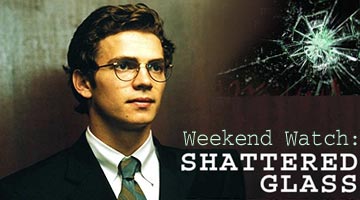
When in his twenties, Stephen Glass (now 31) was employed by the respected American magazine The New Republic, as a reporter. It was a move that would one day create nightmares for editors the world over.
Glass wrote a number of stories for the magazine, a lot of which were very well received. He was liked by colleagues, not just for the work he submitted but also for his charming, eager-to-please personality. Then, he submitted an article titled 'Hack Heaven', supposedly about a 15-year-old computer hacker who had been given a high-paying job by a software company after hacking into its systems.
The story was an interesting one. It also surprised the people at Forbes magazine, who were covering the same beat but had heard nothing about the hacker or his multi-million dollar deal. When their reporter Adam Penenberg did a bit of homework, he realised that nothing mentioned in the Glass story was true. Even the Web site of the company concerned, Jukt Micronics, had been faked Glass had created a crude page at a free site hosting service.
Faced with this damning evidence, The New Republic did some homework of its own. What it found was astonishing. 27 of the 41 stories Glass had written for the magazine had been fabricated. In 1998, he was fired. Five years later, the film Shattered Glass hit screens.
In terms of a plot, the film tells the Stephen Glass tale in a pretty straightforward manner, moving from his early, heady days at the magazine to his ultimate dismissal. The dramatic tension comes thanks to the cast chiefly, Hayden Christensen (who plays Glass admirably) and Peter Sarsgaard, who plays his editor Charles 'Chuck' Lane so well that he ended up with quite a few awards to show for it.
Directed by first-timer Billy Ray -- who wrote the screenplay for Volcano and has now directed Breach, which hits screens next year Shattered Glass has been compared favourably to that other much-praised movie about journalism, All the President's Men: the 1976 classic about the Watergate expose, starring Dustin Hoffman and Robert Redford. The fact that this is a true story only makes it more interesting.
Even though much of the action occurs behind staid office cubicles, boredom refuses to set in. Again, thanks to Hayden Christensen, who somehow manages to convey exactly why Stephen Glass was never doubted thanks to his self-deprecating, ingratiating, nice-guy image that impressed co-workers and superiors alike. For those who wrote the actor off after his role in George Lucas' Attack Of The Clones, this role was probably a slap in their faces.
Interestingly, the year Shattered Glass was released saw another journalism scam that of Jayson Blair. It was discovered that Blair, a former New York Times reporter, had faked quotes and even entire interviews, apart from plagiarising from other newspapers. He had even gone to the extent of submitting false expense records.
Shattered Glass makes for compelling viewing, not just for journalists but for anyone who likes a good story. It is fast-paced, well told, and gives its viewers insights not just into the way journalists function but also into that common human need for recognition that can drive some people into doing a couple of strange things.
As for the DVD, it doesn't come with many extras. There are subtitles in English and Spanish, for some reason, and a commentary by Billy Ray and former New Republic editor Chuck Lane. The only thing worth checking out is a 60 Minutes interview with the real Stephen Glass, who talks candidly about why he did what he did, how he alienated his family, friends and co-workers, and how he's only just beginning to get his life back in order and apologise for his crime.
Want to see how ambition can turn sour within 90 minutes? Watch this.






 © 2025
© 2025